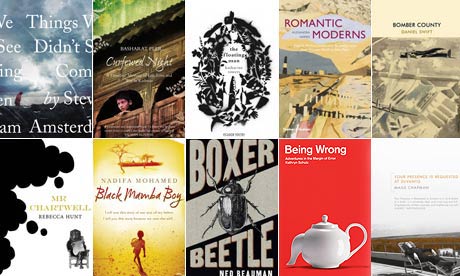
The past vies with the future and poetry with prose on the longlist of the 2010 Guardian first book award, which was announced today. The 10 debut titles in the running for the £10,000 award range from dystopian fiction to popular psychology, and span the globe from Somalia to Finland, Kashmir to Winston Churchill's family home in Kent.
War stalks the pages of the best-known novel on the list, Nadifa Mohamed's Black Mamba Boy, which was longlisted for the Orange prize and has already won the 2010 Betty Trask award. Mohamed takes the story of her father, who left Somalia as a boy and settled in the UK after crossing Africa, and transforms it into fiction inflected by the African tradition of praise poetry. Starting as a 10-year-old boy in 1930s Somalia and journeying through Djibouti, Eritrea, Sudan and Egypt to freedom in Britain, Mohamed's main character witnesses key moments in the African experience of the second world war and embodies the itinerant experience of the Somali community.
According to the chair of the judges, the Guardian's literary editor Claire Armitstead, Mohamed is just one of a group of young British authors on the longlist who are expanding the territory of the novel.
"This year's longlist brings together a younger generation of writers who have moved beyond the social realism of Martin Amis and Ian McEwan, and are pushing at the boundaries of realist fiction," she said.
Armitstead also cited Rebecca Hunt, whose novel Mr Chartwell imagines the depression that haunts both Winston Churchill and a young woman in Battersea as a huge black dog, and Ned Beauman, who explores Nazism, eugenics and entomology in Boxer, Beetle, as responding to the changes in publishing and wider society with fiction that enlarges the possibilities of the novel.
Speaking to the Guardian, Beauman, who expressed his "delight" at finding himself on the longlist, agreed that there was an impulse towards experimentation, but not necessarily in imposing what he called "the literary equivalent of recessional austerity measures".
"Paring away plot, character, humour, lyricism, humanity is more often boring than it is bold," he said. "The Americans know this, and indeed all I did in Boxer, Beetle was smuggle a few postmodern devices across the Atlantic, but at the moment a lot of British readers seem to be falling for this idea that the most interesting fiction has to involve rather dated Modernist self-flagellation."
After the success of projects as various as Inglourious Basterds and The Kindly Ones, he confessed himself unworried by the difficulty of attracting readers to a story which combines the Third Reich and cockroaches. "What has emerged as a bigger obstacle is that everyone finds all the characters so horrible," he said, "which had honestly never occurred to me when I was writing it."
Steven Amsterdam, whose episodic novel Things We Didn't See Coming considers how we might retain our humanity in a future ruled by environmental and technological catastrophe, and Maile Chapman, whose Your Presence is Requested at Suvanto evokes life in a 1920s Finnish asylum, are the two remaining novelists on the list.
Alexandra Harris looks back at the early 20th century through a different lens in Romantic Moderns, a study of how English writers, painters, gardeners, architects, critics and composers imbued the artistic revolutions coming across the channel with a nostalgic sense of place. Daniel Swift considers the lack of imagination that powers modern warfare in Bomber County, an investigation into the death of his grandfather which was sparked by Robert Graves's observation that the second world war produced no great poets. Basharat Peer, meanwhile, reports from the frontline of the conflict between India and Pakistan in a return to his troubled homeland of Kashmir in Curfewed Night.
Kathryn Schulz's Being Wrong, an exploration of how our convictions shape our lives despite being riddled with error, and Katharine Towers's The Floating Man, a collection of poetry haunted by music and water, complete the list.
Armitstead will be joined on the judging panel by the artistic director of the ICA, Ekow Eshun, the author Adam Foulds, the biographer Richard Holmes, the actor Diana Quick, the Guardian's deputy editor, Kath Viner, and Stuart Broom from Waterstone's, who will represent the views of five reading groups hosted in Waterstone's bookshops around the country.
Last year's winner was the Zimbabwean writer Petina Gappah, for her collection of short stories, An Elegy for Easterly. She joined a roster of winners from the 12-year history of the award that includes Zadie Smith, Alex Ross and Jonathan Safran Foer.
The shortlist for this year's prize will be announced in late October, with the winner revealed at the beginning of December.
The longlist
Fiction
Mr Chartwell by Rebecca Hunt (Fig Tree)
Boxer, Beetle by Ned Beauman (Sceptre)
Things We Didn't See Coming by Steven Amsterdam (Harvill)
Your Presence is Requested at Suvanto by Maile Chapman (Cape)
Black Mamba Boy by Nadifa Mohamed (HarperCollins)
Non-fiction
Bomber County: The Lost Airmen of World War Two by Daniel Swift (Hamish Hamilton)
Being Wrong: Adventures in the Margin of Error by Kathryn Schulz (Portobello)
Romantic Moderns: English Writers, Artists and the Imagination from Virginia Woolf to John Piper by Alexandra Harris (Thames & Hudson)
Curfewed Night: A Frontline Memoir of Life, Love and War in Kashmir by Basharat Peer (Harper Press)
Poetry
The Floating Man by Katharine Towers (Picador)
• All titles on the Guardian First Book Award longlist are available at a discount from the Guardian Bookshop. Go to theguardian.com/bookshop or ring 0330 333 6846

